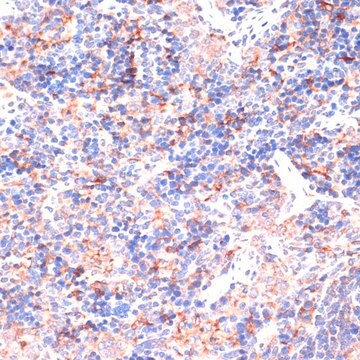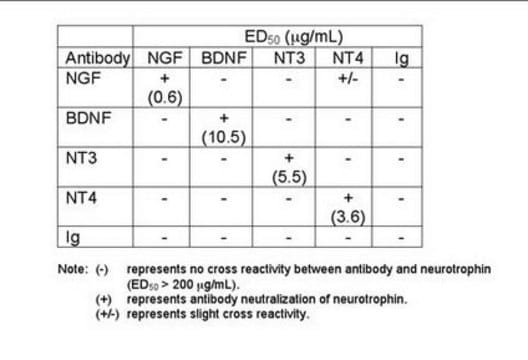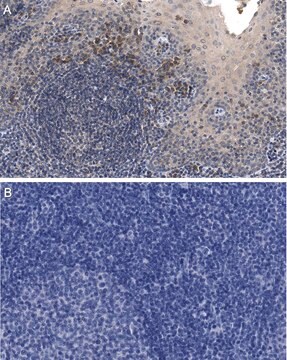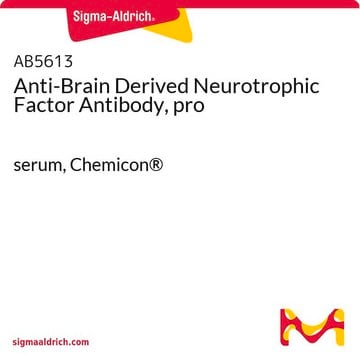CYT306
Rat/Human Brain Derived Neurotrophic Factor ELISA Kit
measures and quantifies BDNF levels in serum, plasma, cell culture supernatent or tissue homogenate
Synonyme(s) :
BDNF, Brain Derived Neurotrophic Factor
About This Item
Produits recommandés
product name
ChemiKine Brain Derived Neurotrophic Factor, Sandwich ELISA, This ChemiKine Brain Derived Neurotrophic Factor, Sandwich ELISA is used to measure & quantify BDNF levels in Neuroscience research.
Niveau de qualité
Espèces réactives
human, rat
Fabricant/nom de marque
ChemiKine
Chemicon®
Technique(s)
ELISA: suitable
Numéro d'accès NCBI
Numéro d'accès UniProt
Application(s)
research use
Méthode de détection
colorimetric
Conditions d'expédition
wet ice
Informations sur le gène
human ... BDNF(627)
Description générale
Test Principle:
With the ChemiKine BDNF assay system, rabbit polyclonal antibodies generated against human BDNF are coated onto a microplate and are used to capture BDNF from a sample. BDNF specific, biotin conjugated, mouse monoclonal antibodies detect the captured BDNF. After addition of streptavidin-enzyme, substrate and stop solution the amount of BDNF is determined. The standard curve demonstrates a direct relationship between Optical Density (OD) and BDNF concentration: i.e., the higher the OD the higher the BDNF concentration in the sample.
Application:
ChemiKine BDNF kit is designed to measure the amount of BDNF in cell culture supernatants, tissue homogenates and biological fluid (serum, plasma, and serum-free) samples from human and rat. There are enough reagents included in this kit for two 96-well immuno-assay plates. Running duplicate wells for samples and standards is recommended.
For Research Use Only. Not for use in diagnostic procedures.
Application
Neuroscience
Composants
Wash Buffer Concentrate: (Part No. 60245) One 100 mL (10X) bottle of Concentrate.
Standard/Sample Diluent: (Part No. 60240) One 60 mL bottle (Ready to Use).
BDNF Standard (Recombinant Human): (Part No. 60237) Two vials (Lyophilized).
Biotinylated Mouse anti-Human BDNF Monoclonal Antibody: (Part No. 60583) One 25 μL vial.
Streptavidin-Enzyme conjugate: (Part No. 60582) One 50 mL vial of HRP conjugated Streptavidin.
TMB/E Solution: (Part No. 60096) Two 10 mL bottles of a Ready to Use solution of 3,3′,5,5′-tetramethylbenzidine in a proprietary buffer with enhancer.
Stop Solution (Part No. 60260): One 22 mL bottle of an HCl solution.
Stockage et stabilité
· Wash Buffer and Sample Buffer contain thimerosal. Thimerosal is highly toxic by inhalation, contact with skin or if swallowed. Thimerosal is a possible mutagen and should be handled accordingly.
· The instructions provided have been designed to optimize the kit′s performance. Deviation from the instructions may result in suboptimal performance of the kit and the failure to produce accurate data.
Informations légales
Clause de non-responsabilité
Mention d'avertissement
Danger
Mentions de danger
Classification des risques
Acute Tox. 4 Dermal - Acute Tox. 4 Inhalation - Acute Tox. 4 Oral - Aquatic Acute 1 - Aquatic Chronic 1 - Eye Dam. 1 - Met. Corr. 1 - Skin Corr. 1C - Skin Sens. 1
Code de la classe de stockage
8A - Combustible corrosive hazardous materials
Certificats d'analyse (COA)
Recherchez un Certificats d'analyse (COA) en saisissant le numéro de lot du produit. Les numéros de lot figurent sur l'étiquette du produit après les mots "Lot" ou "Batch".
Déjà en possession de ce produit ?
Retrouvez la documentation relative aux produits que vous avez récemment achetés dans la Bibliothèque de documents.
Notre équipe de scientifiques dispose d'une expérience dans tous les secteurs de la recherche, notamment en sciences de la vie, science des matériaux, synthèse chimique, chromatographie, analyse et dans de nombreux autres domaines..
Contacter notre Service technique











